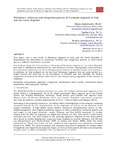Mostrar o rexistro simple do ítem
Remittance behaviour and integration process of Ukrainian migrants in Italy and the Czech Republic
| dc.contributor.author | Ambrossetti, Elena | es_ES |
| dc.contributor.author | Eralba, Cela | es_ES |
| dc.contributor.author | Strielkowski, Wadim | es_ES |
| dc.date.accessioned | 2014-09-24T08:03:31Z | |
| dc.date.available | 2014-09-24T08:03:31Z | |
| dc.date.issued | 2013 | es_ES |
| dc.identifier.citation | Revista latina de Sociología, 2013, 3: 1-11. ISSN: 2253-6469 | es_ES |
| dc.identifier.issn | 2253-6469 | es_ES |
| dc.identifier.uri | http://hdl.handle.net/2183/12621 | |
| dc.description.abstract | [Abstract] This paper uses a case study of Ukrainian migrants in Italy and the Czech Republic to demonstrate the similarities in remittance behavior and integration process of same ethnic group in different destination countries. Our findings show that that remittance behavior of Ukrainian migrants in the Czech Republic and Italy is significantly determined by their financial situation, demographic characteristics, level of human capital and the level of integration as well as the specific context characteristics. In addition, we find evidence for the fact that Ukrainian migrants who are more settled in a target country will send less or no remittances to Ukraine and that therefore the Stark’s hypothesis of remittances decay holds true for this ethnical group regardless of the country of residence. | es_ES |
| dc.language.iso | eng | es_ES |
| dc.publisher | Universidade da Coruña | es_ES |
| dc.subject | International migration | es_ES |
| dc.subject | Integration | es_ES |
| dc.subject | Remittances | es_ES |
| dc.subject | Labor market | es_ES |
| dc.subject | Remittances decay hypothesis | es_ES |
| dc.subject | Czech republic | es_ES |
| dc.subject | Ukraine | es_ES |
| dc.title | Remittance behaviour and integration process of Ukrainian migrants in Italy and the Czech Republic | es_ES |
| dc.type | info:eu-repo/semantics/article | es_ES |
| dc.rights.access | info:eu-repo/semantics/openAccess | es_ES |
Ficheiros no ítem
Este ítem aparece na(s) seguinte(s) colección(s)
-
REV - RLS - Vol. 03 (2013) [8]
Este número contiene un monográfico sobre integración sociolaboral.






